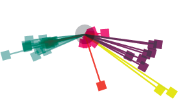2008-2009
An Irish time-variant historical Geographical information System - pilot work
|
British Academy have agreed to fund work investigating sources for an Irish Historical Geographical Information System. Staff from CDDA were involved in a project to create a large Database of Irish Historical Statistics. All the statistics within the Database are spatially referenced but cannot be systematically mapped, or compared over time, without the development of a historical GIS. Once we have a clear record of sources mapping and describing boundary change a full application to create the Irish GIS - using methodologies developed during the Great Britain Historical GIS Project - will be made. Dr Brian Turner has drafted a report of sources for us. |
Completing the Jigsaw: digitisation of parish census datasets
|
The University of Portsmouth submitted a grant to the British Academy under their Small Grants Scheme to fund the digitisation of the remaining census parish-level tables whose digitisation has yet to be funded. The work was based within the Centre. Specifically these were the tables for 1811, 1821 and 1841. Now complete, the Centre has digitised all of the enormous parish level tables from the first British census in 1801 to 1971. Post 1971 tables are already in digital form. These data form a highly significant scholarly resource supporting research within CDDA and the work of colleagues elsewhere. |
Digital Collections - Queen's Special Collections
http://digitalcollections.qub.ac.uk/
|
|
Special Collections & Archives at Queen’s University Belfast provides access to the Library's rare and early printed book, map, and manuscript collections, as well as to more modern material relating to Ireland and Ulster in particular. Collection level descriptions of many of our collections may be found on RASCAL and on the Archives Hub. Guides to manuscript material available for consultation at Special Collections & Archives are here. On this site selected series from different manuscript collections have been digitised so that access to these records is available to a wider audience. The digitisation programme for the manuscript collections is on-going, new material will be added to the site when it becomes available. The books, pamphlets, manuscripts, correspondence, photographs, and maps available for consultation in the Special Collections & Archives Reading Room are considered to be of lasting research value and include examples of the earliest printed works (incunabula), books and pamphlets published between the 16th and early 19th centuries (STC and Wing items) as well as more modern titles. In order to preserve the material for future readers these collections are housed in a secure and environmentally controlled setting. The Reading Room is located on Floor 1 of The McClay Library and provides a comfortable, dedicated space appropriate to the consultation of Special Collections & Archives materials. Wireless internet access is available. A brief guide to Special Collections and guidance on handling our material and using the Reading Room is available from the Special Collections & Archives link above. |
Mapping the realm: English cartographic construction of fourteenth-century Britain
|
CDDA, together with other colleagues in the School of Geography, have received a Social Science Small Research Grant from the British Academy. The project is a pilot for a planned larger research collaboration between Queen's University and the Bodleian Library, Oxford. It represents a pioneering exercise in the conversion of an historical map into digital format and its incorporation into a GIS. Its subject is the c.1350 Gough Map, described by the Bodleian Library as 'the most important map in the University's holdings'. The aim is to develop and host an interactive, multimedia, high-resolution, digital version of the Gough map, thereby broadening academic and public access to this unique source. At the same time, the foundations will be laid for a full reassessment of the map’s creation, contents, and meaning. |
The Exploitation of the Semantic Web: Extending metadata resources, content technologies, discovery tools, and search effectiveness across domains
|
CDDA is a partner with the Arts and Humanities Data Service, The University of California, Berkeley and others in this University of Liverpool led project funded by the JISC. As the information available on the Internet increases it will be more difficult for researchers to find relevant information. This application is concerned with developing tools to aid resource discovery. The project will use the varied Electronic Cultural Atlas Initiative data holdings as a testbed. |


